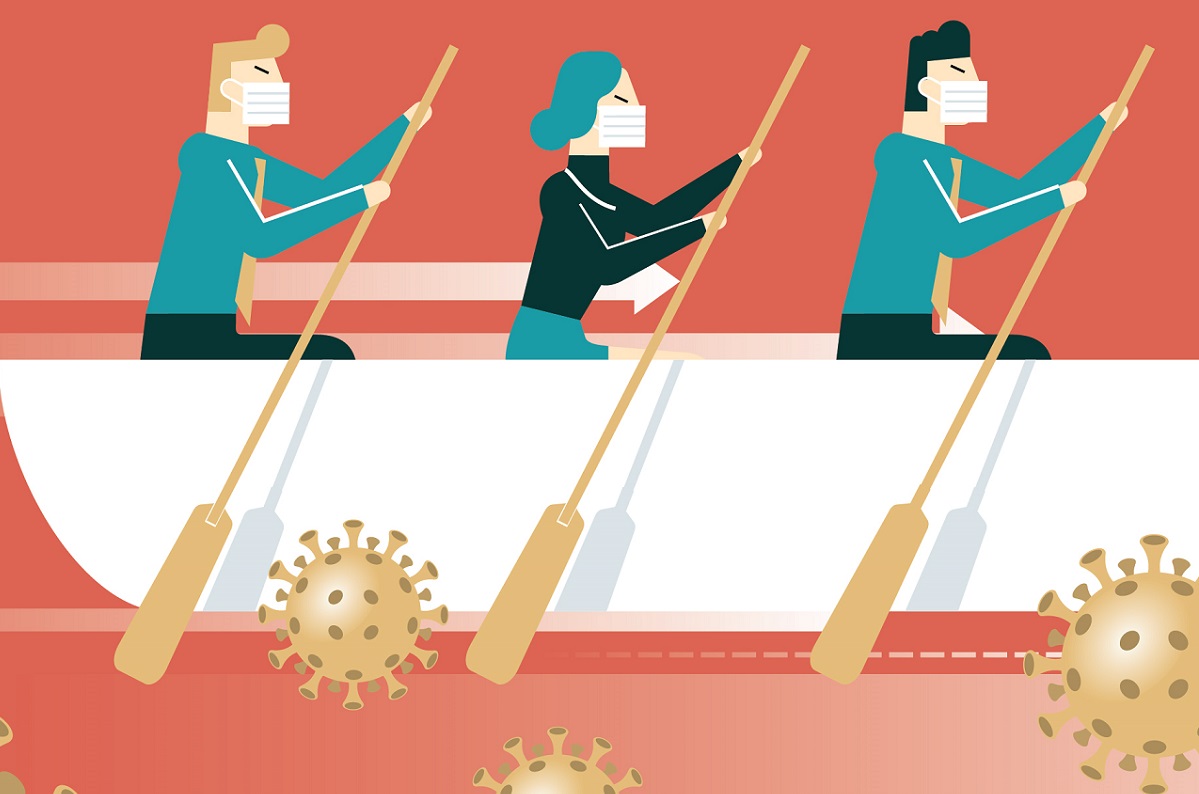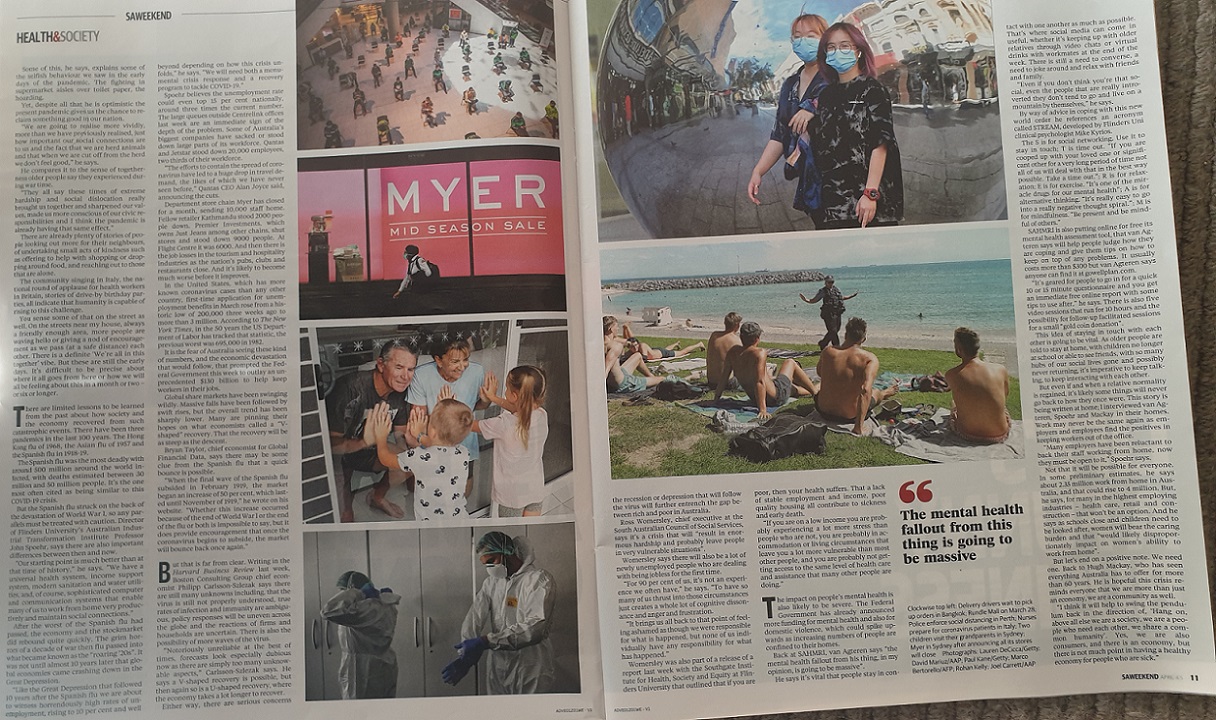
From economics to health care or disaster management, Flinders University experts are contributing much to the management of what could be the worst global crisis since the Second World War, sharing expert insights, recommendations and solutions.
Economic challenges
Professor John Spoehr has been in demand for economic analysis, predictions and recommendations. These include suggesting the urgent need for a massive wage subsidy program before its introduction last week and contributing to a large spread in The Advertiser (below) on Saturday April 4, explaining the difference between the economic environment surrounding the Spanish Flu and today’s situation, and suggesting where we can expect to see unemployment trend in Australia.
Shared by television news around the country yesterday, Professor Spoehr also brought to light the expected hike in household energy bills as millions of Australians work or study at home. He said with the use of heaters and electrical equipment rising significantly, people on lower incomes due to COVID-19 will struggle to pay higher energy bills and concessions available to job seekers may need to be extended to others. View Channel 7 news report.
The increasing hardships identified by Professor Spoehr are also highlighted in the telling report SA: The Heaps Unfair State – Why Have Health Inequities Increased In South Australia And How Can This Trend Be Reversed?
Prepared by the Southgate Institute for Health, Society and Equity at Flinders University and the South Australian Council of Social Service, the report identifies social and economic problems that are leading to growing health inequities in South Australia.
A key chapter – A toxic mix: Deindustrialisation, structural changes to employment opportunities, and unequal incomes – outlines the vulnerability of growing numbers of South Australians due to increasing economic hardships and decreasing incomes. This and other insights triggered the report’s raft of almost 40 recommendations to redress the current situation in SA.
Professor Julie Ratcliffe has taken a broader approach to the economic picture, pointing out Why it’s not health vs the economy in the COVID-19 crisis in an opinion piece for the Committee for Economy Development of Australia.

Mental health and wellbeing
The Advertiser spread on April 4 also shared Professor Mike Kyrios’ STREAM strategy for dealing with social isolation and mental health. His expertise and advice have attracted much interest around the world and STREAM has become a much referred resource in assisting the billions of people experiencing isolation.
Children’s needs
Youth sport and parenting expert Dr Sam Elliott has suggested parents develop a set of guiding principles to help children maintain involvement in sporting activities at home where sport participation is a vital part of their identity and development.
He says it is important to consider how the sudden cancellation of seasonal sport is impacting the emotional wellbeing of many children, including a psychological state akin to mourning for some and the loss of a primary social network for many.
Dr Elliott compiled age-group specific recommendations to help parents assist children’s sport-oriented progress within the confines of small backyards or apartments.
Meanwhile Dr Leigh Burrows has offered advice on learning from home, noting this can be an ideal time for children’s natural interests to flourish.
“Parents may think home education should resemble what they did at school, when in fact it can be a chance to connect with children and follow their interests,” she says.
Dr Burrows is eager to assure parents that a day of home education doesn’t have to be structured to the hour and recommends a morning of semi-structured learning and a more open afternoon.
Vaccine development
Professor Nikolai Petrovsky is leading a team developing a vaccination for the SARS-CoV-2 coronavirus responsible for the COVID-19 pandemic. Working with Oracle Cloud technology developed by local company Vaxine Pty Ltd, the team has quickly developed a vaccine candidate which is currently undergoing animal testing in the United States.
“We achieved great results with Vaxine’s swine flu vaccine developed during the 2009 swine flu pandemic, where we commenced clinical trials of a vaccine within 3 months of discovery of the virus. We hope to achieve similar results with their COVID-19 vaccine candidate when it is ready for human testing,” Professor Petrovsky says.
View Australian Financial Review article.
Engaging information sessions
An internationally recognised clinician with past experience on the WHO expert review panel for global strategy and plan of action on public health, Vice President of the College of Medicine and Public Health Professor Jonathan Craig has put his expertise to use hosting online college forums for staff and students to discuss the COVID-19 epidemiology.
Well positioned to deliver an analysis of COVID-19 as it evolves, Professor Craig hosted an engaging Forum last Thursday that has been shared with the broader University audience and can be viewed online, with a PDF of the slides available on the College COVID-19 website (under ‘Information sessions’.)
Rural health
Flinders University Emeritus Professor Paul Worley, who is the National Rural Health Commissioner, has raised the alarm for Australia’s rural health workforce, including for elderly clinicians remaining in rural practice and the need to isolate and care for any confirmed cases in rural and remote areas.
In an editorial in Rural and Remote Health, Professor Worley suggests sweeping changes to cope with the crisis, and prepare for improved services in the future.
He says urgent changes to be more prepared and resilient in future include making better use of resources across primary care, secondary care and other social services; greater integration of services between towns and smaller centres; rural practice based on teams of generalists; using technology and remote learning options to continually improve the rural workforce; and affordable and accessible telehealth for patients and their clinicians.
“We will not be immune as systems and people are strained to breaking point,” he warns.
He brought up many critical issues including the impact on older doctors and clinicians who continue to work in rural practices, past deskilling of local clinicians due to health service role changes who are now faced with delivering high-level care, and the challenges around testing and care in smaller communities.
Defence training
While internally Flinders University has been quick and comprehensive in delivering all learning online, it has also worked creatively despite COVID-19 to help defence workers upskill for future defence jobs.
The University’s digital diploma will be offered entirely online to more than 50 workers who would otherwise have been stood down. It’s a virtual jobs bridge that will ensure we have skilled workers for the major shipbuilding project that will take on added importance as an economic driver in this difficult employment era.
Communications
Dr Paul-Gardner Stephens’ knowledge of communications as applied to disaster management has been drawn on to understand how internet use is being affected by the COVID-19 situation, explaining how Australian services are delivered, and providing advice for people impacted negatively by slow internet speeds.

